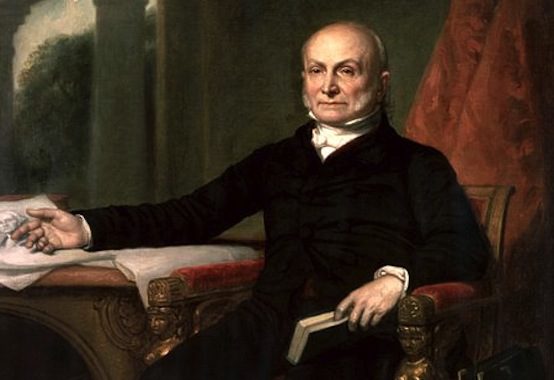A Think Tank Dedicated to Peace and Restraint

Stephen Kinzer comments on the creation of a new think tank, The Quincy Institute, committed to promoting a foreign policy of restraint and non-interventionism:
Since peaceful foreign policy was a founding principle of the United States, it’s appropriate that the name of this think tank harken back to history. It will be called the Quincy Institute, an homage to John Quincy Adams, who in a seminal speech on Independence Day in 1821 declared that the United States “goes not abroad in search of monsters to destroy. She is the well-wisher to the freedom and independence of all. She is the champion and vindicator only of her own.” The Quincy Institute will promote a foreign policy based on that live-and-let-live principle.
The creation of a think tank dedicated to “an approach to the world based on diplomacy and restraint rather than threats, sanctions, and bombing” is very welcome news. Other than the Cato Institute, there has been nothing like this in Washington, and this tank’s focus will be entirely on foreign policy. The lack of institutional support has put advocates of peace and restraint at a disadvantage for a very long time, so it is encouraging to see that there is an effort underway to change that. The Quincy Institute represents another example of how antiwar progressives and conservatives can and should work together to change U.S. foreign policy for the better. The coalition opposed to the war on Yemen showed what Americans opposed to illegal and unnecessary war can do when they work towards a shared goal of peace and non-intervention, and this institute promises to be an important part of such efforts in the future. Considering how long the U.S. has been waging war without end, there couldn’t be a better time for this.
TAC readers and especially readers of this blog will be familiar with the people involved in creating the think tank:
The institute plans to open its doors in September and hold an official inauguration later in the autumn. Its founding donors — Soros’s Open Society Foundation and the Charles Koch Foundation — have each contributed half a million dollars to fund its takeoff. A handful of individual donors have joined to add another $800,000. By next year the institute hopes to have a $3.5 million budget and a staff of policy experts who will churn out material for use in Congress and in public debates. Hiring is underway. Among Parsi’s co-founders are several well-known critics of American foreign policy, including Suzanne DiMaggio, who has spent decades promoting negotiated alternatives to conflict with China, Iran and North Korea; the historian and essayist Stephen Wertheim; and the anti-militarist author and retired Army colonel Andrew Bacevich.
“The Quincy Institute will invite both progressives and anti-interventionist conservatives to consider a new, less militarized approach to policy,” Bacevich said, when asked why he signed up. “We oppose endless, counterproductive war. We want to restore the pursuit of peace to the nation’s foreign policy agenda.”
Trita Parsi and Andrew Bacevich are both TAC contributors and have participated in our foreign policy conferences in recent years. Parsi and I were on the same panel last fall at our most recent conference. I have also cited and learned from arguments made by Suzanne DiMaggio and Stephen Wertheim in my posts here. Their involvement is a very good sign, and it shows both the political breadth and intellectual depth of this new institution. I look forward to seeing what they do, and I wish them luck.